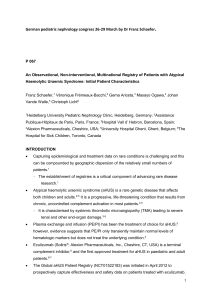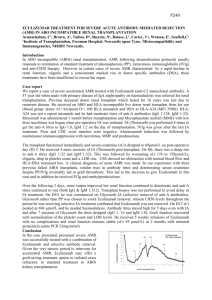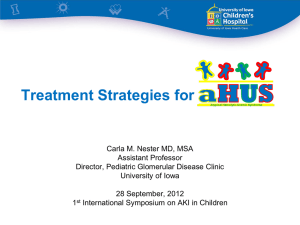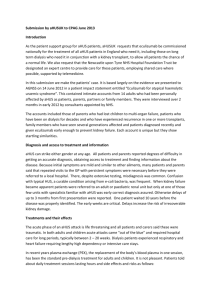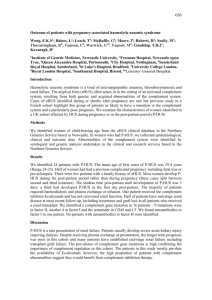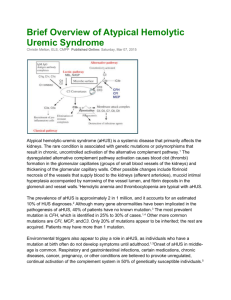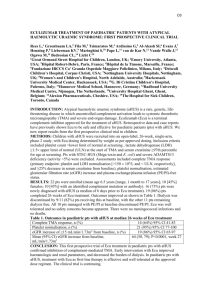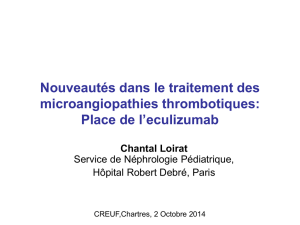Eculizumab stakeholder meeting outcome statement – (Word
advertisement
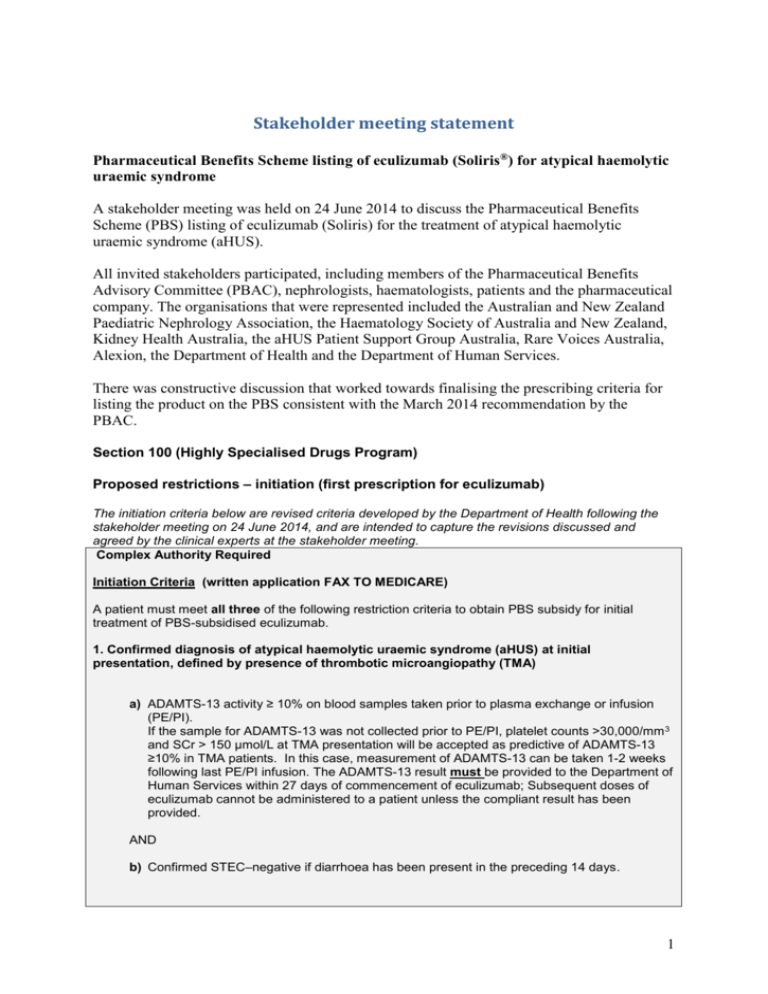
Stakeholder meeting statement Pharmaceutical Benefits Scheme listing of eculizumab (Soliris®) for atypical haemolytic uraemic syndrome A stakeholder meeting was held on 24 June 2014 to discuss the Pharmaceutical Benefits Scheme (PBS) listing of eculizumab (Soliris) for the treatment of atypical haemolytic uraemic syndrome (aHUS). All invited stakeholders participated, including members of the Pharmaceutical Benefits Advisory Committee (PBAC), nephrologists, haematologists, patients and the pharmaceutical company. The organisations that were represented included the Australian and New Zealand Paediatric Nephrology Association, the Haematology Society of Australia and New Zealand, Kidney Health Australia, the aHUS Patient Support Group Australia, Rare Voices Australia, Alexion, the Department of Health and the Department of Human Services. There was constructive discussion that worked towards finalising the prescribing criteria for listing the product on the PBS consistent with the March 2014 recommendation by the PBAC. Section 100 (Highly Specialised Drugs Program) Proposed restrictions – initiation (first prescription for eculizumab) The initiation criteria below are revised criteria developed by the Department of Health following the stakeholder meeting on 24 June 2014, and are intended to capture the revisions discussed and agreed by the clinical experts at the stakeholder meeting. Complex Authority Required Initiation Criteria (written application FAX TO MEDICARE) A patient must meet all three of the following restriction criteria to obtain PBS subsidy for initial treatment of PBS-subsidised eculizumab. 1. Confirmed diagnosis of atypical haemolytic uraemic syndrome (aHUS) at initial presentation, defined by presence of thrombotic microangiopathy (TMA) a) ADAMTS-13 activity ≥ 10% on blood samples taken prior to plasma exchange or infusion (PE/PI). If the sample for ADAMTS-13 was not collected prior to PE/PI, platelet counts >30,000/mm 3 and SCr > 150 µmol/L at TMA presentation will be accepted as predictive of ADAMTS-13 ≥10% in TMA patients. In this case, measurement of ADAMTS-13 can be taken 1-2 weeks following last PE/PI infusion. The ADAMTS-13 result must be provided to the Department of Human Services within 27 days of commencement of eculizumab; Subsequent doses of eculizumab cannot be administered to a patient unless the compliant result has been provided. AND b) Confirmed STEC–negative if diarrhoea has been present in the preceding 14 days. 1 2. Evidence of active and progressing TMA, defined by pathology test abnormalities. Patients must demonstrate EITHER a) Platelet consumption as defined by thrombocytopenia (platelet count <150,000 x 10 9/L); AND Haemolysis as indicated by the documentation of two of the following: schistocytes on the blood film; low or absent haptoglobin; or lactate dehydrogenase (LDH) above normal. OR b) Tissue biopsy confirming TMA in those patients without evidence of platelet consumption and haemolysis to meet pathology requirements. 3. Evidence of at least ONE of the following documented clinical features of active organ damage or impairment a) Kidney impairment as demonstrated by one of the following: decline in estimated Glomerular Filtration Rate (eGFR) of >20% in a patient with preexisting renal impairment; and/or serum Creatinine (sCr) > upper limit of normal (ULN) in patients who have no history of pre-existing renal impairment (i.e. who have no baseline eGFR measurement); or sCr > the age-appropriate ULN in paediatric patients (subject to advice from a paediatric nephrologist); and/or renal biopsy. b) Onset of neurological impairment related to TMA; c) Onset of cardiac impairment related to TMA, d) Onset of gastrointestinal impairment related to TMA; e) Onset of pulmonary impairment related to TMA. Notes - Eculizumab increases a patient's susceptibility to serious meningococcal infections (septicaemia and/or meningitis). Vaccinate patients with a meningococcal vaccine at least 2 weeks prior to receiving the first dose of SOLIRIS®; revaccinate according to current medical guidelines for vaccine use Patients less than 2 years of age and those who are treated with SOLIRIS® less than 2 weeks after receiving a meningococcal vaccine must receive treatment with appropriate prophylactic antibiotics until 2 weeks after vaccination. Monitor patients for early signs of meningococcal infections, evaluate immediately if infection is suspected, and treat with antibiotics if necessary. The clinical uses for which the PBAC considered that sufficient evidence was provided by the sponsor to support a claim of efficacy as well as cost-effectiveness focus on two groups: patients experiencing their first episode of aHUS who achieve a complete thrombotic microangiopathy (TMA) response and normal renal function, and patients with recurrent disease who are not dialysis-dependent who achieve a complete TMA response and whose renal function reverts to their baseline. The initiation criteria reflect therefore on those two patient groups. For clarity, transplantation alone does not render a patient ineligible for eculizumab, so patients who have active aHUS following renal transplantation are eligible provided they meet all other criteria. 2 However, it was noted that patients must not have previously experienced a “treatment failure” with prior eculizumab, as this will preclude eligibility for PBS-subsidised therapy. The sponsor requested listing in two distinct groups of patients with aHUS: Patients with active, progressive TMA during acute episodes of aHUS, who have not progressed to end stage renal disease; Patients with end stage renal disease on chronic dialysis who are demonstrating extrarenal TMA or who are suitable for a kidney transplant. Although the significant morbidity and mortality associated with long-term dialysis for patients who had progressed to end stage renal failure was noted by the PBAC in March 2014, the committee was unable to determine the efficacy and cost-effectiveness of eculizumab for prevention of recurrence of TMA following kidney transplantation. Data about use in these patients should become available over time and therefore, this additional indication could be reconsidered for subsidy in the future. Proposed restriction – continuation The continuing treatment criteria have been developed within the PBAC recommendation that a Managed Entry Scheme for eculizumab in aHUS would address the uncertainties around both the incremental effectiveness and cost-effectiveness of eculizumab compared to supportive care. The PBAC considered that a Managed Entry Scheme would enable the listing of eculizumab at a price justified by the existing evidence, as follows: the price requested in the submission for those patients with first presentation of aHUS who achieve complete remission and non-dialysis dependent patients with recurrent aHUS who achieve complete remission. The PBAC considered that complete remission would require a patient to have no TMA and to have normal renal function at six months from the initiation of therapy. In patients with recurrent aHUS, complete remission would require no TMA and renal function equivalent to their baseline at six months. Scaled rebates would be applied for those patients who do not achieve complete remission at 6 months. The sponsor would be required to rebate the Commonwealth: a specified percentage of the price of eculizumab for patients initially requiring dialysis who achieve dialysis independence after 6 months of eculizumab therapy. a specified percentage of the price of eculizumab for patients who did not require dialysis and who achieve a >25% improvement in renal function where the renal function remains abnormal but is not classified as end stage renal disease. the full price of eculizumab in those patients who: (i) fail to achieve a >25% improvement in renal function; (ii) die within 6 months; or (iii) have established end stage renal disease. 3 The 6-month continuation criteria below are revised criteria developed by the Department of Health following the stakeholder meeting on 24 June 2014, and are intended to capture the revisions discussed and agreed by the clinical experts at the stakeholder meeting. Continuation criteria at 6 months (written application) After 6 months of initial PBS-subsidised eculizumab, treatment response is required for further subsidised treatment with eculizumab A patient must demonstrate ‘treatment response’ at 6 months to be eligible for a further 6 month supply of subsidised eculizumab therapy. ‘Treatment response’ at 6 months is defined as: - Haematological normalisation (as demonstrated by at least 2 of the following, haptoglobin, LDH or platelet count AND EITHER - An “improvement” which requires an increase in eGFR of >25% from baseline (where the baseline is the date of commencement of eculizumab). “Stabilisation”, defined as an eGFR within ± 25% from baseline. An “inadequate response’, defined as avoidance of dialysis-dependence but worsening of kidney function with a reduction in eGFR ≥ 25% from baseline. PBS subsidised treatment with eculizumab will not be permitted beyond six months if a patient has experienced ‘treatment failure’. ‘Treatment failure’ at six months is defined as a patient who: - is dialysis-dependent at 6 months AND has failed to demonstrate significant resolution of extra-renal complications if originally present; OR - on dialysis and has been on dialysis for ≥ 4 of the previous 6 months while receiving eculizumab AND has failed to demonstrate significant resolution of extra-renal complications if originally present In the absence of data proving the need for lifelong treatment in the majority of patients and considering the potential for harms with long term use, some which are already known, the PBAC considered that for patients who are able to demonstrate a response to the point that they achieve remission, it would be reasonable for PBS-subsidised treatment to discontinue after six months given that eculizumab is not without side effects. Clinical progress would be monitored and the need for further treatment assessed. The sponsor, Alexion, disagreed and stated that all patients should routinely have uninterrupted, life-long therapy. In support, the sponsor referred participants to the Product Information, approved by the Therapeutic Goods Administration (TGA), which states that “treatment is recommended to continue for the patient’s lifetime, unless the discontinuation of Soliris is clinically indicated”. The sponsor also stated that the safety profile of eculizumab has been monitored for 10 years with paroxysmal nocturnal haemoglobinuria (PNH) and aHUS with thousands of patientyears exposed. During this time there have been 39 cases of meningococcal infections reported, 30 patients recovered, 3 patients recovered with sequelae and 6 patients died. 4 The clinicians present considered that a longer period than the six-months stated by the PBAC might be needed to maximise the chances of treatment success. All agreed that longterm data on the optimal dose and duration of treatment with eculizumab for patients with aHUS are lacking. The 12-month continuation criteria below are revised criteria developed by the Department of Health following the stakeholder meeting on 24 June 2014, and are intended to capture the revisions discussed and agreed by the clinical experts at the stakeholder meeting. Continuation criteria at 12 months (written application FAX TO MEDICARE) Continuing treatment After 12 months initial treatment with eculizumab, patients are only eligible for continuing treatment if the patient demonstrates both of the following: An ongoing ‘treatment response’ (defined as in 6 month continuation criteria); 1. AND 2. The patient has limited organ reserve, defined as either: Severe cardiomyopathy, severe neurological impairment; severe gastrointestinal impairment, severe pulmonary impairment, related to TMA; OR - Grade 4 or 5 chronic kidney disease (eGFR <30ml/min). - Patients who discontinue eculizumab must be monitored in accordance with the specified monitoring program. Criteria for recommencement of eculizumab after recurrence of aHUS (written application FAX TO MEDICARE) A patient previously diagnosed with aHUS and who responded to treatment with eculizumab and has not failed eculizumab is eligible to restart eculizumab if the following clinical conditions are met: - significant haemolysis as evidenced by presence of schistocytes on the blood film, or low or absent haptoglobin, or LDH above normal; AND EITHER - Platelet consumption as measured by either ≥ 25% decline from patient baseline or thrombocytopenia (platelet count <150,000 x 109/L); OR - TMA related organ impairment including on recent biopsy. Note: 1. raised LDH alone is not a sufficient reason to re-commence eculizumab, but thrombocytopenia with one marker of haemolysis (such as raised LDH, presence of schistocytes, or low/absence of haptoglobin) is an accepted reason to re-commence. 2. Kidney transplantation/dialysis is not a contraindication to recommencement A patient who becomes eligible to restart eculizumab, in accordance with the above criteria, must be assessed every 6 months for treatment response or failure. Finally, all stakeholders considered that a structured program for further data collection would be valuable, and that the evidence should be placed into the public domain for use by researchers, government and industry alike. 5 The following data were identified by the PBAC as being of interest as reflected in the minutes from the March 2014 meeting: patient outcomes, including rates of dialysis required in short and long term, rates of avoidance of end stage renal disease, rates and degrees of improvements in renal function, TMA response, complete remission, death. factors that may modify patient response to eculizumab, particularly a patient’s genetic sub-type and stage of disease. the standard initial management of aHUS. the safety of eculizumab. the duration of treatment required to achieve maximal response, the durability of response with eculizumab, including assessment as to consequences of discontinuation of eculizumab therapy in complete responders. the capacity for salvage with eculizumab if eculizumab is ceased after 4 to 6 months in those patients who achieve remission. costs of treatment and estimation of cost-offsets. The Department of Health will continue to work with the sponsor to finalise risk sharing arrangements consistent with the PBAC recommendation from March 2014 and the clinical criteria worked through today, recognising the high and unmet clinical need for an effective treatment for patients with aHUS. 6
